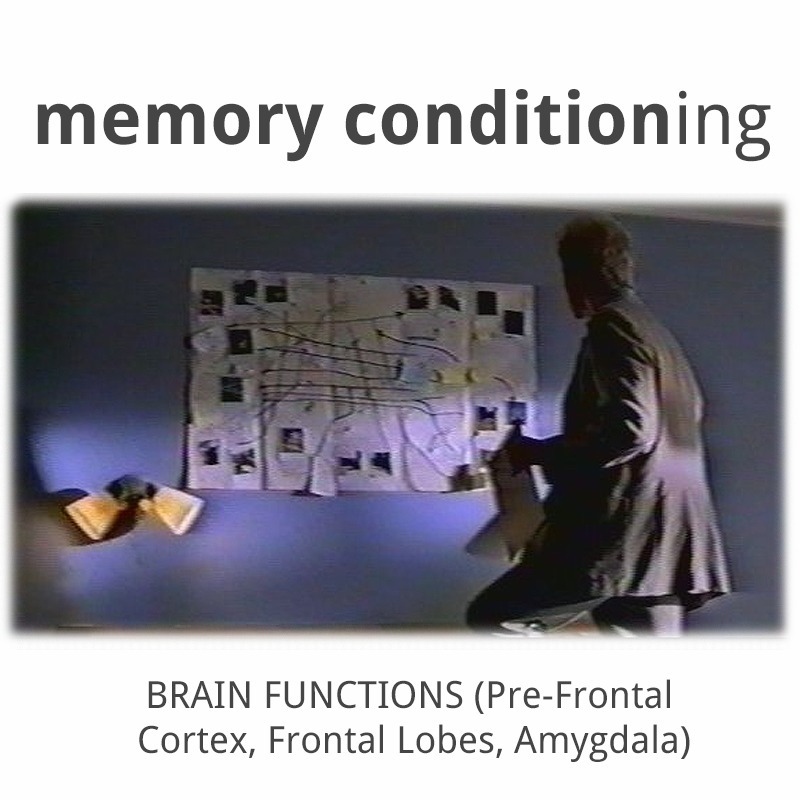433a: Memory Conditioning - Brain Functions (Pre-Frontal Cortex, Frontal Lobe, Amygdala)


#MemoryCondition
In gaining an understanding of the memory system, it is important to recognize that memory functions are happening throughout several distant but interconnected regions of the brain. In this two part episode, we'll tour the parts of the brain at work in the memory process, starting from the front and working backwards.
As each function is described, you can decide where you feel there might be room for improvement.
The Memory Process In A Nutshell
1. external events occur
2. Stimuli encounters the 5 senses
3. Senses transport data to the working memory - holding area
4. central processor - controls how much attention is given to the contents of the working memory
5. Long-term memory - data stored and potentially available for recall
How to Maintain a Healthy Frontal Lobe
http://www.breachbuilders.org/article.php?story=20100111015631512
-find challenges, be mindful, avoid automatic pilot:
-manage information exposure, practice blocking, discarding, and ignoring less relevant tasks and information.
The 3 Ts of the Frontal Lobe
Tension: The unique ability of a human to rise above emotional reactions, and selfish – primitive behaviors.
Tact: The ability to understand and apply socially acceptable behaviors. Tenacity: The ability to focus on one thing for a period of time.
Children with ADHD are known to have poor-functioning frontal cortices and thus they have an inability to apply the 3 T’s effectively.
A Strong Pre-Frontal Cortex
https://en.wikipedia.org/wiki/Prefrontal_cortex
http://www.edutopia.org/blog/strategies-strengthening-brains-executive-functions-donna-wilson-marcus-conyers
http://www.brainbalancecenters.com/blog/2014/03/improving-executive-function-skills/
Studies Referenced on Executive Functioning: (links)
- regular exercise and overall physical fitness have been linked to academic achievement
“Exercise and Children’s Intelligence, Cognition, and Academic Achievement”
Phillip D. Tomporowski et al., Educational Psychology Review, 2008
- success on specific tasks like safely crossing a busy street while talking on a cell phone
“Role of Childhood Aerobic Fitness in Successful Street Crossing”
Laura Chaddock et al., Medicine & Science in Sports & Exercise, April 2012
- post quicker reaction times, give more accurate responses, and are more effective at detecting errors
“Impact of Aerobic Exercise Training on Cognitive Functions and Affect Associated to the COMT Polymorphism in Young Adults”
Sanna Stroth et al., Neurobiology of Learning and Memory, 2010
- assigned older adults to three one-hour sessions of exercise a week for six months
“Aerobic Exercise Training Increases Brain Volume in Aging Humans”
Stanley J. Colcombe et al., The Journals of Gerontology: Series A, 2006
AMYGDALA ACTIVATION
http://www.clear-mind-meditation-techniques.com/amygdala-brain-training.html
http://www.calmclinic.com/anxiety/amygdala
A list of reliable online memory assessments:
University of Washington Short-Term Memory Test
MemTrax Memory Test
Psychology Today Memory Test
Rutgers University Memory Self-Tests (verbal and Visual)
Ohio State University Self-Administered Gerocognitive Examination (SAGE)
You can use this comprehensive assessment from Douglas Herrmann's book Super Memory.







 Bumper Music:
Brain Parts Song by Aaron Wolf
Bumper Music:
Brain Parts Song by Aaron Wolf
Please Support School Sucks
 Our Amazon Wish List
Donate With Bitcoin
Or Join the A/V Club
Your continued support keeps the show going and growing, which keeps us at the top of the options for education podcasts and leads to new people discovering this message. This subscription also grants you access to the A/V Club, a bonus content section with 200+ hours of exclusive audio and video.
If you are a regular consumer of our media, please consider making a monthly commitment by selecting the best option for you...
Our Amazon Wish List
Donate With Bitcoin
Or Join the A/V Club
Your continued support keeps the show going and growing, which keeps us at the top of the options for education podcasts and leads to new people discovering this message. This subscription also grants you access to the A/V Club, a bonus content section with 200+ hours of exclusive audio and video.
If you are a regular consumer of our media, please consider making a monthly commitment by selecting the best option for you...
| A/V Club - Basic Access - $8.00/Month | AP Club - "Advanced" Access - $12.00/Month | Sigma Sigma Pi - Full Access - $16.00/Month |
|---|---|---|
